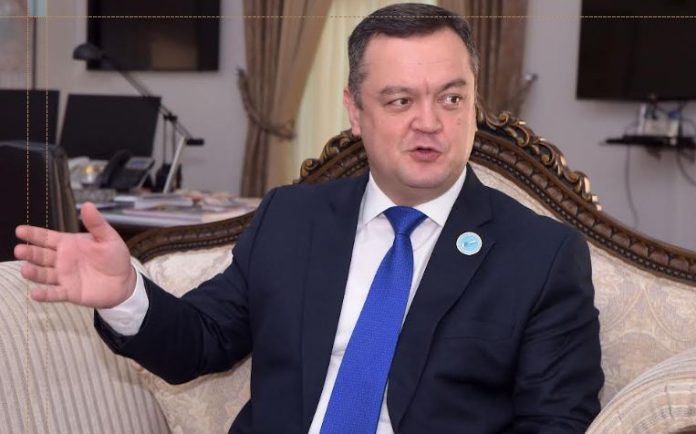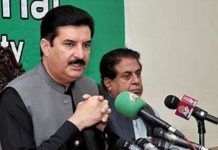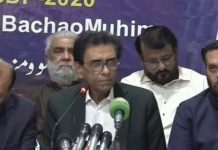Exclusive
Ansar Mahmood Bhatti
ISLAMABAD, /DNA/ – In an exclusive interview with Islamabad POST and Centreline magazine, His Excellency Alisher Tukhtaev, Ambassador of Uzbekistan to Pakistan, emphasized the deep-rooted cultural, historical, and religious bonds between Uzbekistan and Pakistan. He highlighted the shared heritage of the two nations, which has laid a strong foundation for enhanced cooperation in tourism, agriculture, and strategic diplomacy.
The first part of the interview was published in this newspaper on June 11,2025.
The ambassador’s remarks underscored Uzbekistan’s commitment to strengthening bilateral relations with Pakistan, focusing on economic collaboration, people-to-people exchanges, and regional connectivity.
Ambassador Tukhtaev noted that both Uzbekistan and Pakistan are home to some of the most revered Islamic scholars, architects, and cultural landmarks, making them ideal destinations for spiritual and heritage tourism.
“Uzbekistan and Pakistan share a unique cultural and historical heritage, which holds great significance not only for our peoples but also for the entire Muslim world,” he said. “The fact that both countries are the birthplace of outstanding Islamic scholars, architects, and cultural figures provides a strong foundation for the development of spiritual and cultural tourism.”
In recent years, there has been a surge in Pakistani tourists visiting Uzbekistan, particularly the historic cities of Bukhara, Samarkand, Tashkent, and Khiva—renowned for their stunning Islamic architecture and rich history. Similarly, Uzbek travelers are increasingly drawn to Pakistan’s cultural hubs, including Lahore, Karachi, and Taxila.
To facilitate travel, Uzbekistan has simplified visa procedures for Pakistani citizens starting September 2024. Additionally, direct flights between Tashkent and Lahore operate twice a week, and Tashkent- Islamabad once a week with discussions underway to expand air connectivity to other cities.
The ambassador also revealed plans for joint ziyorat (pilgrimage) tourism initiatives, including guided tours to holy sites. Both nations are exploring the creation of cultural and historical routes tracing the footsteps of great Muslim scholars and leaders.
“We are considering the creation of cultural and tourist routes tracing the footsteps of our great ancestors and Muslim scholars,” he said. “We are also working on programs for tourist exchanges, participation in exhibitions, festivals, and fairs.”
The Uzbek Embassy in Pakistan is actively promoting tourism through information campaigns, exhibitions, and collaborations with Pakistani tour operators.
“We are confident that the activation of tourism will not only contribute to economic cooperation but also strengthen the friendship and mutual understanding between our peoples,” Ambassador Tukhtaev added.
Agriculture remains a cornerstone of both Uzbekistan’s and Pakistan’s economies, contributing significantly to employment, food security, and exports. Given their similar climatic conditions, the two countries have immense potential for collaboration in agri-tech, irrigation, and crop production.
The ambassador outlined several initiatives aimed at boosting agricultural cooperation:
• Joint ventures in agro-processing – Enhancing value addition for crops such as cotton, fruits, and grains.
• Modern irrigation techniques – Introducing drip irrigation and water-efficient farming methods.
• Seed production and logistics – Sharing expertise in high-yield seed varieties and cold storage solutions.
• Digital agriculture – Leveraging technology for precision farming and data-driven agriculture.
“Uzbekistan is interested in joint production of agricultural machinery, technologies for product storage and processing, as well as learning from Pakistan’s experience in growing certain crops, including rice and vegetables,” the ambassador stated.
To facilitate knowledge sharing, both nations plan to organize joint agro-forums, exhibitions, and academic exchanges between agricultural universities and research institutes.
“In the long term, we aim to create a platform for the systematic exchange of best practices, specialist training, and the promotion of sustainable agriculture,” he said.
Such collaborations are expected to enhance food security in the region while boosting rural economies in both countries.
As Uzbekistan’s top envoy to Pakistan, Ambassador Tukhtaev outlined his key priorities for strengthening bilateral ties in the coming years.
Economic collaboration remains a top priority, with a focus on:
• Increasing bilateral trade volume.
• Implementing large-scale infrastructure projects, including the Uzbekistan-Afghanistan-Pakistan (UAP) railway, which will enhance regional connectivity.
• Establishing logistics hubs to facilitate trade between Central and South Asia.
“We aim to expand the volume of bilateral trade, implement large-scale investment and infrastructure projects, and enhance business contacts between the entrepreneurs of the two countries,” he said.
The ambassador emphasized the importance of high-level diplomatic engagements, including:
• Regular visits by government and parliamentary delegations.
• Enhanced cooperation within international organizations such as the Shanghai Cooperation Organization (SCO) and the Organization of Islamic Cooperation (OIC).
Given regional security challenges, both nations are committed to:
• Counterterrorism efforts.
• Combating extremism and transnational crime.
• Intelligence-sharing and joint training programs.
“We continue the dialogue and exchange of experience on issues of regional stability, combating terrorism, extremism, and transnational crime,” he stated.
People-to-people connections remain vital for long-term friendship. Key initiatives include:
• Student exchange programs between Uzbek and Pakistani universities.
• Cultural festivals showcasing music, art, and cuisine.
• Youth engagement programs to foster mutual understanding.
“It is crucial for our peoples, especially the youth, to get to know each other better—this is the foundation for strong friendship and sustainable interaction,” the ambassador remarked.
Ambassador Tukhtaev expressed optimism about the future of Uzbekistan-Pakistan relations, citing strong political will and public support.
“I am confident that with the support of the leadership of Uzbekistan and Pakistan, and thanks to the friendly sentiments between our peoples, we will be able to elevate bilateral relations to a qualitatively new level,” he concluded.
As both nations move forward, the focus remains on enhancing connectivity, boosting trade, and fostering cultural exchanges—ensuring a prosperous and mutually beneficial partnership for years to come.

















